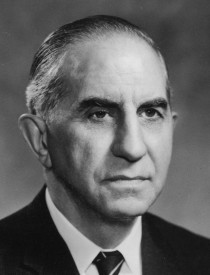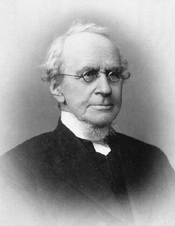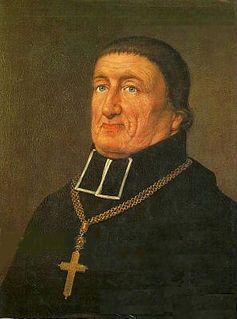This article is an orphan, as no other articles link to it . Please introduce links to this page from related articles ; try the Find link tool for suggestions. (June 2018) |
| Benedikt Maria Leonhard von Werkmeister | |
|---|---|
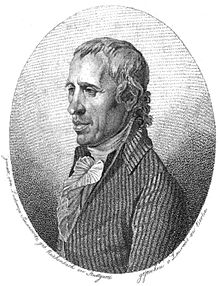 | |
| Born | October 22, 1745 Füssen |
| Died | July 16, 1823 |
| Occupation | |
Benedikt Maria Leonhard von Werkmeister (October 22, 1745 – July 16, 1823) was a German Roman Catholic theologian and representative of the so-called Josephinism or reformatory tendency in his Church. He was born at Fussen, in Upper Swabia, October 22, 1745, and became a Benedictine monk in 1765. By direction of his abbot he studied theology at Benedictbeuren, making Oriental languages and exegesis his principal subjects, and finding in father Aegidius Bartscherer a teacher who developed in him the faculty for independent research which he naturally possessed. He soon discovered that ethics, which appeared to him to be of primary importance, was altogether overlooked by theologians in their eagerness to employ their wits upon the mysterious. He could not be satisfied with the schemes of probabilists or probabiliorists, of liberalists or rigorists, among the Romish teachers of ethics, and saw himself obliged to seek for what he wanted in the lectures of the Protestants Gellert and Mosheim, and in the Life of Jesus by Hess.

Germans are a Germanic ethnic group native to Central Europe, who share a common German ancestry, culture and history. German is the shared mother tongue of a substantial majority of ethnic Germans.

The Catholic Church, also known as the Roman Catholic Church, is the largest Christian church, with approximately 1.3 billion baptised Catholics worldwide as of 2017. As the world's "oldest continuously functioning international institution", it has played a prominent role in the history and development of Western civilisation. The church is headed by the Bishop of Rome, known as the Pope. Its central administration, the Holy See, is in the Vatican City, an enclave within the city of Rome in Italy.

Josephinism was the collective domestic policies of Joseph II, Holy Roman Emperor (1765–1790). During the ten years in which Joseph was the sole ruler of the Habsburg Monarchy (1780–1790), he attempted to legislate a series of drastic reforms to remodel Austria in the form of what liberals saw as an ideal "Enlightened" state. This provoked severe resistance from powerful forces within and outside his empire, but ensured that he would be remembered as an "enlightened ruler" by historians from then to the present day.
In 1769 Werkmeister became a priest and superintendent of novices at Neresheim, the latter post being associated with that of professor of philosophy. He filled a similar chair at Freysing from 1772 to 1774; then became secretary to the prelate of the empire; archivist and librarian at Neresheim; and afterwards resumed his duties as professor of philosophy at Freysing, and added to them those of a director of the curriculum, of a professor of canon law, and a librarian. Duke Charles of Wurttemberg made Werkmeister his court preacher in 1784, and, being a highly enlightened Roman Catholic, permitted him to both preach and administer the ritual of his Church as he might prefer. A fruit of this liberty is presented to view in the Gesangbuch nebst angehdngten Gebeten, etc., for the ducal chapel (1784–86), which contains a large number of Protestant hymns and tunes, and is wholly in keeping with the general style of hymnology and liturgy in that time.
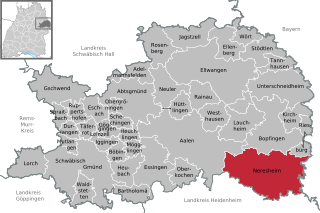
Neresheim is a town in the Ostalbkreis district, in Baden-Württemberg, Germany. It is situated 16 kilometres (9.9 mi) northeast of Heidenheim, and 20 kilometres (12 mi) southeast of Aalen. It's the home of the Neresheim Abbey, which still hosts monks, was Reichsfrei until the German Mediatisation and was built by Balthasar Neumann.
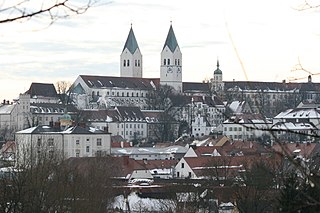
Freising is a town in Bavaria, Germany, and the capital of the Freising district, with a population of 45,227.

Charles Eugene, Duke of Württemberg, was the eldest son, and successor, of Charles Alexander; his mother was Princess Maria Augusta of Thurn and Taxis.
Physical ailments began to trouble Werkmeister seriously in 1787, and to make it difficult and ultimately impossible for him to preach; and as the presumptive heir to the throne, Louis Eugene, brother of Charles, was known to be a bigot, and likely to dismiss every liberal priest from his service whenever he should have the power, he applied for secularization and the canonry of Spires. The former was granted and the latter denied, and in 1794 Werkmeister and his colleagues were superseded by Franciscans and Capuchins. The duke even requested that Werkmeister should be banished; but the Monastery of Neresheim gave him asylum until another change in the succession of the duchy took place, when he was recalled to his former post at Stuttgart. He now applied for and received the parish of Steinbach (1796). In 1807 he became a member of the ecclesiastical council for the Romnish Church in Wurtemberg, and in 1810 of the newly erected supervisory council. In 1816 he was appointed to the direction of education, and in 1817 he received the title of high councillor for ecclesiastical affairs and the knight's cross of the Order of the Wurtembergian Crown. He died July 16, 1823.

Ludwig Eugen, Duke of Württemberg, was the third son of Duke Karl Alexander and Princess Maria Augusta of Thurn and Taxis – 1 February 1756).

Speyer is a town in Rhineland-Palatinate, Germany, with approximately 50,000 inhabitants. Located beside the river Rhine, Speyer is 25 km south of Ludwigshafen and Mannheim. Founded by the Romans, it is one of Germany's oldest cities. Speyer is dominated by the Speyer Cathedral, a number of churches and the Altpörtel. In the cathedral, beneath the high altar, are the tombs of eight Holy Roman Emperors and German kings.

The Franciscans are a group of related mendicant religious orders within the Catholic Church, founded in 1209 by Saint Francis of Assisi. These orders include the Order of Friars Minor, the Order of Saint Clare, and the Third Order of Saint Francis. They adhere to the teachings and spiritual disciplines of the founder and of his main associates and followers, such as Clare of Assisi, Anthony of Padua, and Elizabeth of Hungary, among many others.
Werkmeister was a rationalist, though of the noble sort, and lacked profoundness of religious thought and feeling. He never penetrated into the spiritual depths of religion, but, on the other hand, he never sought to set aside the authority of Scripture and of the received doctrines of the evangelical faith. He had the boldness to attack various Romish teachings and institutions, e.g. the celibacy of priests, the worship of Mary, the indissolubility of marriage, etc. He did not regard his course in this respect as involving him in conflict with the Church, but only with what was impure and spurious that had fastened itself upon her in the progress of ages. It would seem, nevertheless, that he carried about with him the idea of a German National Church which should be independent of Rome, but none the less Roman Catholic. His works of a literary character possess only historical interest at this distance from his time. The most important is the Jahresschrift fur Theologie und Kirchenrecht der Katholiken (1806–20, 5 volumes, edited by him), in which he opposes many abuses of the Roman Catholic. Church. Of his ascetical works, his Neues Gebetbuch fur aufgeklarte katholische Christen (Heilbronn, 1801; 11th ed. 1818) is especially deserving of mention, as well as his Sermons (1812–15, 3 volumes). See Schmidt, Neuer Nekrolog der Deutschen, 1823, 2:578; Herzog, Real-Encyklop. s.v.




